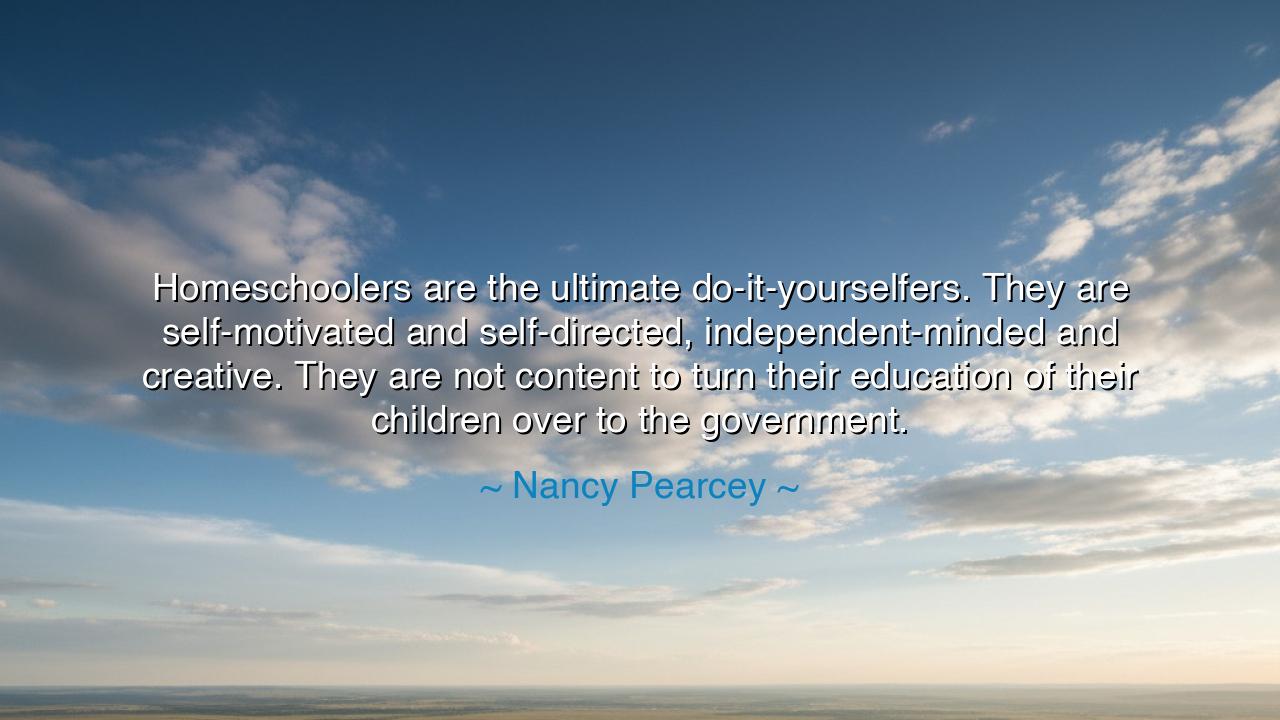
Homeschoolers are the ultimate do-it-yourselfers. They are
Homeschoolers are the ultimate do-it-yourselfers. They are self-motivated and self-directed, independent-minded and creative. They are not content to turn their education of their children over to the government.






“Homeschoolers are the ultimate do-it-yourselfers. They are self-motivated and self-directed, independent-minded and creative. They are not content to turn their education of their children over to the government.” Thus wrote Nancy Pearcey, a thinker and author who has long spoken of the need for individuals to reclaim the shaping of the mind and the soul from the hands of bureaucracy. Her words stand as a hymn to the spirit of self-reliance — that ancient and enduring virtue that has carried civilizations forward, even when institutions have faltered. In these words, Pearcey does not merely praise a method of education; she honors a way of life. The homeschooler, in her view, is a symbol of courage and conviction — a parent or teacher who dares to take back from the state the sacred duty of forming the next generation.
The origin of this quote lies in the modern struggle over education — a realm once guided by family and community, now increasingly shaped by governments and centralized systems. In the late twentieth and early twenty-first centuries, the homeschooling movement arose as a quiet rebellion against the growing reach of state-run education. Many parents feared that schools had ceased to nurture virtue and wisdom, teaching instead conformity and dependence. Pearcey, whose writings often explore the relationship between faith, culture, and reason, saw in these families not merely dissenters, but builders of freedom. Their classrooms were kitchens and gardens; their teachers, mothers and fathers; their textbooks, not only pages of print, but the world itself.
When she calls them “the ultimate do-it-yourselfers,” Pearcey invokes a spirit older than modern schooling — the spirit of the pioneer, the craftsman, the philosopher who learns not by decree, but by discovery. To be self-motivated and self-directed is to take ownership of one’s destiny, to walk the harder road of independence rather than the smooth path of convenience. Such people, she says, are independent-minded and creative, for they do not look to government or institution to define truth or shape imagination. In this way, homeschooling becomes not merely an educational choice, but a declaration of sovereignty — a statement that the family is the first and most enduring school of human life.
History offers us many examples of this principle. In the early days of America’s frontier, before public schools reached the wilderness, it was in log cabins and candle-lit rooms that the young were taught. There, amid hardship and isolation, mothers and fathers taught their children to read from the Bible, to cipher numbers by hand, to ponder nature as their teacher. From these humble homes came inventors, poets, statesmen, and farmers — men and women who built the foundation of a nation. Even the great Abraham Lincoln, before ever entering a formal school, learned by reading borrowed books by the fireside, guided by a mother’s love and his own insatiable curiosity. Such stories remind us that the seed of learning is not planted by systems, but by the yearning heart.
Pearcey’s warning, subtle yet powerful, lies in her phrase: “They are not content to turn their education of their children over to the government.” She speaks here of a sacred trust — that the raising of a child is the first responsibility of the parent, not the state. When governments assume the right to define what a child should know, think, and believe, they encroach upon the very essence of liberty. For education is not merely the transfer of knowledge; it is the shaping of the soul. To hand that power to political authorities is to risk the loss of freedom itself. The homeschooling parent, then, stands as a guardian of autonomy — one who keeps alive the flame of individuality in an age of mass instruction.
Yet Pearcey’s words are not meant as condemnation of public education, but as an exhortation to awaken. Whether one teaches at home or in school, the lesson remains the same: education must be personal, passionate, and purposeful. It must teach not only facts, but virtue; not only skills, but wisdom. The do-it-yourself spirit she celebrates is the spirit of those who question, who create, who take responsibility for truth. For it is not the institution that educates — it is the heart that hungers to learn.
Therefore, O listener, take this teaching to heart. Whether you are a parent, a student, or a citizen, remember that the formation of the mind is too precious to outsource, too sacred to neglect. Be self-directed in your pursuit of knowledge. Question what is handed to you. Teach your children to think freely, not to conform blindly. For the greatness of a nation does not lie in the efficiency of its schools, but in the character of its people — in citizens who are wise, independent, and creative.
Let this be the enduring wisdom of Nancy Pearcey’s words: that education is not the duty of the state, but the birthright of the human soul. The true teacher is not the government, but the parent; not the bureaucracy, but the seeker. To educate is to liberate, and to take that calling into one’s own hands is the highest act of freedom. Thus, may we all, in spirit if not in practice, become do-it-yourselfers — builders of knowledge, lovers of truth, and guardians of the mind’s unending light.






AAdministratorAdministrator
Welcome, honored guests. Please leave a comment, we will respond soon